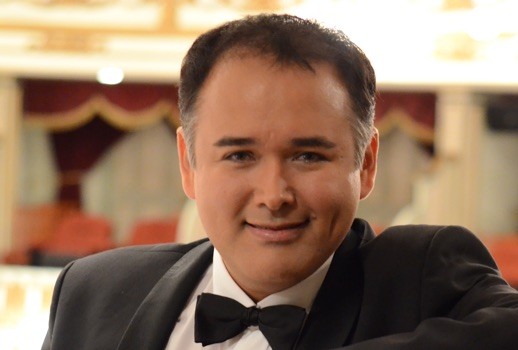
Javier Camarena, heard in recital at the Kennedy Center Thursday with collaborator Angel Rodriguez, exemplified another way, with a performance carefully calibrated to a more intimate venue that nonetheless offered emotionally potent results. While straying (somewhat) afield from the sunny bel canto comedies have made him one of the most beloved stars on the Met’s roster, Camarena managed successfully to scale the same guileless stage presence that makes him so successful in those works to the small stage.
Of course, he also has that voice going for him. His inviting golden timbre, so easily produced up and down the range, makes one want to reach for all sorts of clumsy images that probably sound bad on paper (comfort food, a warm bath.) The celebrated security of his upper register, only occasionally called for in this program, is all the more thrilling for the extra bit of heft he takes above the staff. In contrast to, say, the superhuman but slightly neutered high notes of a Juan Diego Flórez, it is the added muscular presence of Camarena’s voice that makes it irresistible.
Camarena and Rodriguez, both clad in formal tails, set a sober tone for the evening, waiting for the audience to come to a hushed stillness (well, as much stillness as can be had amidst a nearly constant refrain of coughing) before launching into a deadly serious bout of warm-up Beethoven. Camerena was immediately present, delivering slightly muted, focused intensity in “Wonne der Wehmut.”
If this repertoire proved not quite his home territory, the longing “Was zieht mir das Herz so?” and charming “Keine Blumen kleine Blatter” showed sensitive engagement with the text. Camarena allowed for a momentary break in the tension when an audience member’s phone started bleating the triumphal march from Aida, quipping “Not on the program today, perhaps in a few years.”
The Beethoven was followed by an extravagantly committed “Tre Sonetti di Petrarca,” Liszt’s overwrought settings of the medieval poet’s paeans to his mysterious Laura. This is heady stuff that could easily become ponderous, especially for heavier voices, but this is not a danger for Camarena. In the turbulent “Pace non trovo,” he vividly inhabited Petrarch’s simultaneous fascination with and fear of his own love for Laura, building to a piercing D-flat, followed by the haunting final lines rendered in beautiful mezza voce.
The closing “I’ vidi in terra,” a meditation on Laura’s heavenly qualities, might be tossed off as a torch song in other hands, but Camarena offered a range of delicately shaded dynamics, the final notes sweetly evaporating into nothing. The muy sensitivo Rodriguez, whose velvety touch contributed much to the winning effect of these songs, was seen wiping away a tear during the bows.
The second half of the program was devoted to the songs of Belle Epoque composer Francesco Paolo Tosti. His four dramatic songs based on the poetry of Gabriele D’Annunzio are not going to win any awards for subtlety (favorite line: “The grass is bloodstained with love…”), but they provide rich melodic and dramatic possibility. Entering on the thinnest wisp of sound, Camarena brought to life the plaintive “Lasciami! Lasia ch’io respire,” with a range of smoky colors, while unabashed love song “L’alba separa dalla luce l’ombra” showed off considerable crooning skills and inimitable Italian style.
After one more dip into the dramatic deep-end in the melodramatic, suicide-curious “Che dici, o parola del Saggio,” Camarena closed with a valedictory tour of four of Tosti’s better-known popular songs.
Camarena settled into what he (perhaps unwisely) hinted would be a generous encore set with a slightly more festive Tosti selection, though this was clearly not quite the catharsis the audience (especially an adoring Mexican contingent) had in mind, and they began shouting recommendations.
To one patron’s hopeful cry of “Ah mes amis,” Camarena obliged by rattling off the final bars. All jokes aside, Camarena duly acquiesced with two of his signature showpieces, “Jurame” and “Granada” each capped with bravura top notes and rapturous receptions.
Photo: Jonathan Muró.





Comments